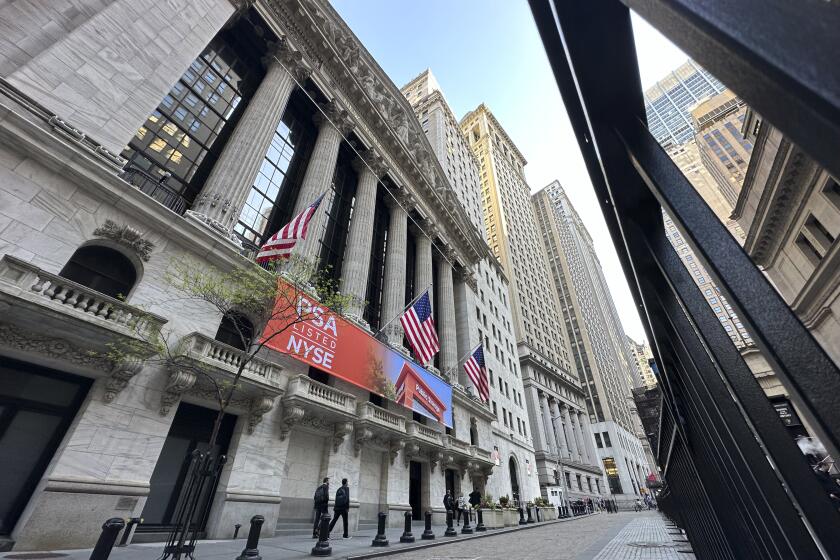SEC Seeks Disclosure of Fund Trading Abuses
Fallout from the mutual fund industry scandal spread Thursday as federal regulators said they were demanding that funds and brokerage firms disclose whether they engage in the sorts of abuses alleged a day earlier by New York state officials.
The Securities and Exchange Commission said it was sending letters to major fund companies and investment banks seeking detailed information about any involvement in “late trading” and “market timing,” the harmful trading practices highlighted by New York Atty. Gen. Eliot Spitzer on Wednesday. Industrywide, the practices cost small investors billions of dollars while enriching privileged traders, such as hedge funds, and generating fees for the mutual fund companies, Spitzer said.
The SEC also will begin dispatching examiners today to conduct on-site probes of certain firms.
“We’re asking them for any indication that there’s similar misconduct at their firms,” said Lori Richards, head of the SEC’s Office of Compliance Inspections and Examinations.
Though Spitzer one-upped the SEC by acting first, just as he did with the Wall Street brokerage probe that led to a $1.4-billion settlement last spring, the SEC’s involvement Thursday showed the value of “regulatory competition,” one expert said.
“What Spitzer did absolutely compels the SEC to act,” said Henry Hu, a securities law professor at the University of Texas at Austin.
Spitzer said mutual fund management firms Janus Capital Group Inc., Strong Capital Management, Bank of America Corp. and Bank One Corp. allowed a hedge fund to engage in late trading or market timing in exchange for stashing other assets in long-term funds between 1999 and July 2003. The hedge fund, Canary Capital Partners, agreed to a $40-million settlement, but none of the mutual fund companies has been charged with wrongdoing.
Late trading allows some investors to buy a fund at the day’s closing share price after hours, enabling them to capitalize on news that breaks in the evening. Spitzer also alleged special market-timing deals with Canary that allowed the hedge fund to engage in rapid trading of several funds, diluting the funds’ value for long-term holders.
The SEC is seeking information from brokerage firms in part to determine whether they helped hedge funds with these trading techniques -- either with or without assistance from mutual fund firms, Richards said.
Meanwhile, Massachusetts securities regulators launched a separate investigation of possible improper mutual fund trading by brokers at the Boston office of Prudential Securities Inc.
Massachusetts Secretary of State William F. Galvin said the inquiry, which began months ago, focuses on whether Prudential brokers engaged in market-timing trades of mutual funds on behalf of large customers, possibly hedge funds.
It appears that at least some of the mutual funds tried to fend off the market-timing efforts, Galvin said in an interview Thursday. But he said investigators still are trying to determine “whether there was coercion on the mutual funds to accept the trades or whether they were deceived into accepting them.” The possibility of collusion between the brokers and the mutual funds hasn’t been ruled out.
Prudential, in a written statement, said it “intends to cooperate fully with the inquiry and that, to the best of its knowledge, all such trading in mutual fund shares was proper and in compliance with applicable legal and regulatory requirements.”
Other states will not necessarily launch mutual fund investigations in Spitzer’s wake, but his disclosures will heighten state regulators’ awareness, said Christine Bruenn, Maine state securities chief and president of the North American Securities Administrators Assn.
Questionable trading practices will be “one more item on the checklist when you’re doing a mutual fund examination,” Bruenn said. California’s top securities cop, Corporations Commissioner Demetrios A. Boutris, declined to comment.
On the legislative front, Senate Republicans are not yet ready to join their House counterparts in seeking reform of the mutual fund industry.
The Senate Banking Committee has scheduled a Sept. 30 hearing on the state of the securities industry, with SEC Chairman William H. Donaldson as the star witness. The panel will discuss mutual funds, hedge funds and the settlement over Wall Street analysts’ conflicts of interest, according to committee spokesman Andrew Gray.
The information obtained at the hearing will help the committee decide whether legislation is needed, Gray said.
Spitzer’s revelations could set off a fresh wave of litigation as investor lawyers who have thus far targeted stock analysts and investment banks suddenly draw a bead on mutual funds.
New York securities attorney Jacob Zamansky has routinely turned down potential cases against fund companies, figuring the industry’s generally positive image made them tough to win.
He reassessed that thinking Thursday.
“I wasn’t taking too many mutual fund cases in the past, and I just today asked my staff to reexamine complaints by mutual fund holders with a view toward bringing cases,” Zamansky said.
As for the fund industry, the executive committee of its chief trade group, the Investment Company Institute, will meet today in Washington to discuss the unfolding scandal, said Chairman Paul G. Haaga Jr.
“The first thing coming out of the ICI is outrage and disappointment, if these allegations are true,” Haaga said. “As the details emerge, we’ll determine whether there are additional steps that can be taken by us.”
Mulligan and Hamilton reported from New York, Friedman from Los Angeles.






